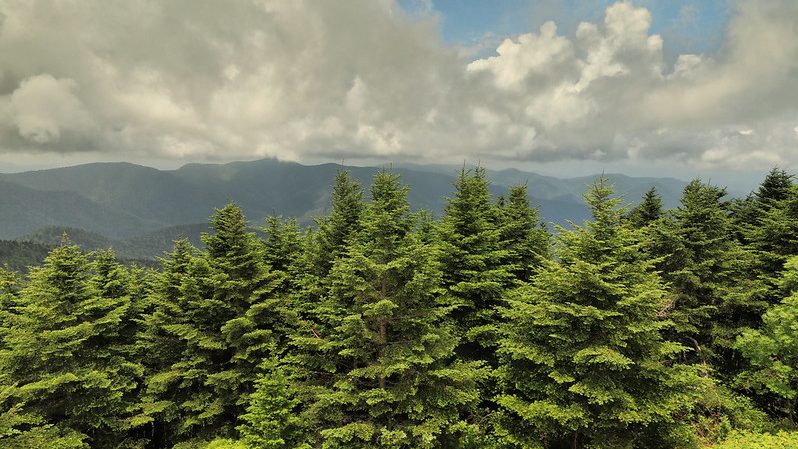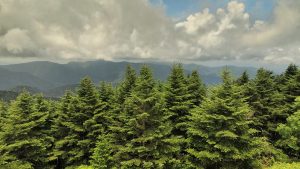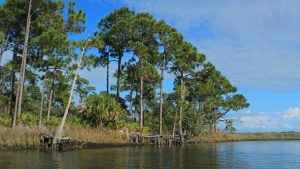January 2020 Newsletter

January 2020 Newsletter
Welcome to the Southeast Climate Adaptation Science Center’s January 2020 Newsletter.
For news and upcoming events related to the Southeast Climate Adaptation Science Center, subscribe to our monthly newsletter.

Southeast Climate Adaptation Science Center News

2019 was filled with great research and opportunities for SE CASC researchers and Global Change Fellows. Check out the 2019 SE CASC Retrospective to learn more about our year and see what’s ahead in 2020.
Mark your calendars for the first Global Change Seminar of the semester – Fire: Connecting Science, Management, and Policy, to be held on Thurs., February 6, 3:30 pm in 101 David Clark Labs on NC State campus and via remote connection. Event details.
The next presentation in our NCA4 webinar series will be held on February 11 from 12pm – 1pm ET. Bill Gould (Director, USDA Caribbean Climate Hub) will provide an in-depth look at Chapter 20: U.S. Caribbean. Register here.
Kirstin Dow gave a presentation on Economic and Health Risks for Rural Communities in the Southeast as part of the NCA4 webinar series. View a recording of the presentation and our guide to understanding this key message.
Statements of Interest for SE CASC FY2020 project funding are due Jan. 31. More information.
Learn more about the SE CASC project, Protecting Cultural Resources in the Face of Climate Change here.
New Researcher Spotlight: Global Change Fellow, Sam Flake.
2014 – 2015 Global Change Fellow, Marketa Zimova, is lead author on a SE CASC supported publication, Local climate determines vulnerability to camouflage mismatch in snowshoe hares. Learn more.
SE CASC Research Ecologist Mitch Eaton and others published, Spatial conservation planning under uncertainty: adapting to climate change risks using modern portfolio theory. Learn more about the work here.
Faculty Affiliate pubs:
2015-16 Global Change Fellow, Rene Valdez and Faculty Affiliate, Matthew Booker: Scenario analysis on the use of rodenticides and sex-biasing gene drives for the removal of invasive house mice on islands.
Faculty Affiliates, Bethany Cutts, Ryan Emanuel, and Katherine Martin: Applying climate change risk management tools to integrate streamflow projections and social vulnerability.
Faculty Affiliate, Andrew Fox: The power of place in disaster recovery: Heritage-based practice in the post-Matthew landscape of Princeville, North Carolina.
Faculty Affiliate, Jelena Vukomanovic: Custom Geospatial Tool Helps National Park Service Better Predict Fire Risk on Florida’s River of Grass.
Latest from Conservation Corridor: Plant diversity benefits from corridors over long time scales.
Resources
FEATURED RESOURCE
Customized Two-Page Sea Level Rise Fact Sheets.

Downloadable files allow users to develop customized fact sheets that describe local sea level rise scenarios and potential impacts at specific locations in the northern Gulf of Mexico. Fact sheets have been developed for each of the federally managed lands in the area, as part of SE CASC project, New Sea Level Rise Fact Sheets for Federal Lands in Northern Gulf of Mexico, and are available in SE CASC Resources. Learn more.
In addition to our Featured Resource, the following tools were demonstrated at the Southeast CASC Regional Science Symposium Poster/Tools Networking Session.
Fire Weather Intelligence Portal. A real-time monitoring tool for weather and fire risk information to help plan prescribed burns, analyze historical conditions affecting burn success, and track environmental indicators of drought and fire danger. Provides easy access to past, current, and short-term forecast conditions for a variety of weather parameters. Learn more.
The Gulf Coast Conservation Prioritization Tool (CPT). CPT enables users to evaluate a proposed conservation project or suite of projects. This tool is relevant to the broad land conservation community, including land trusts, federal and state agencies,NGOs and private industry. Learn more.
Tribal Resources Web App. A web-based platform that hosts climate adaptation resources and general resources for, and about, Federally and State Recognized Tribal Nations as well as geographic information and web links to connect users to Tribal websites. Learn more.
The Florida Conservation Planning Atlas (CPA). A data discovery, visualization, and analytical platform for stakeholders throughout Florida to increase collaboration. Tools found on the atlas include Climate Adaptation Explorer, Conservation Actions Tracker, Fire Map Viewer, Simple Map Viewer and Advanced Mapper. Learn more.
Ecosystem Services Maps. Ecosystem services map products for wild pollination, recreational birding, and open space access, are now available for download. Products include regional priority areas at the county and watershed levels as well as underlying information that enables users to refine the prioritization for specific areas of interest. Learn more.
Forests After Florence. Mapping the path of Hurricane Florence and its impact on urban forests, coastal communities and NCSU students. Learn more.
In the Media
Teaching Resilience in the Face of Climate Change. NY Times
Louisiana researchers tackle a changing Mississippi Delta. PBS
Marine Labs on the Water’s Edge Are Threatened by Climate Change. NY Times
How tribal wisdom can help climate science. The Hill
The Top 10 Weather and Climate Stories of 2019. Scientific American

Notable Publications
Typologizing Stakeholder Information Use to Better Understand the Impacts of Collaborative Climate Science. Recently, there has been a growing interest among scholars to produce climate information that is useful to natural resource managers, creating a shift from scientist to stakeholder-driven or collaborative research approaches. In this study, researchers explored 13 collaborative climate science projects conducted in the western U.S. between 2012 and 2016 to better understand what researchers can expect and plan for in terms of stakeholder use of research findings. Conceptual, instrumental, and justification were the three primary types of use to emerge, with conceptual being the most prevalent. Overall, the authors suggest that this typology can facilitate a more methodical understanding of stakeholder utilization of project outputs and their impacts. Link to article.
Ongoing accumulation of plant diversity through habitat connectivity in an 18-year experiment. Biodiversity is threatened globally by loss of habitat and fragmentation of remaining habitat. Retaining corridors that connect habitat patches can reduce losses by facilitating movement of species, but changes in biodiversity due to either lost or restored connectivity can take many years to be evident. Using long-term data from a large, replicated, habitat fragmentation experiment in a pine savanna ecosystem, researchers showed quantitatively how these losses are reduced. Corridors reduced the likelihood of plant extinction in patches by about 2% per year and increased the likelihood of patch colonization by about 5% per year. This resulted in a steady, nonasymptotic increase in diversity over the 18-year project, with nearly 14% more species in connected fragments compared to unconnected patches. They conclude that the value of increasing habitat connectivity to conserve biodiversity is much greater than previously estimated at short time scales and can be maximized by connecting habitat sooner rather than later. Link to article.
Designing markets for biodiversity offsets: lessons from tradable pollution permits. Governments worldwide face a continuous tradeoff between increasing economic development and conserving biodiversity. One tool which could lower the perceived cost of conservation and secure biodiversity protection, allowing some economic development to still take place, is the market for biodiversity offsets. This study looks to pollution permit markets, an extensively researched environmental market, to determine four key parameters that would encourage participation and foster the development of a biodiversity offset market. These parameters include policy targets and exchange currencies, a trading ratio, market scale and trading volume, as well as market regulation to encourage participation and facilitate the development of a biodiversity offset market. Link to article.
Recent increase in catastrophic tropical cyclone flooding in coastal North Carolina, USA: Long-term observations suggest a regime shift. North Carolina coastal areas have experienced three extreme tropical cyclone-driven flood events since 1999, leading to devastating human impacts and significant changes to the surrounding water quality, biogeochemistry, and ecological conditions. Researchers examined continuous rainfall records for coastal NC since 1898 to determine if the apparent increase in frequency and magnitude of such events was due to a coincidence or if it implied an overall regime shift in tropical cyclone flooding and associated ecosystem impacts. Data revealed a period of unprecedentedly high precipitation since the late-1990’s, and a trend toward increasingly high precipitation associated with tropical cyclones over the last 120 years. This suggests a recent regime shift that will result in significant implications for hydrology, carbon and nutrient cycling, water and habitat quality, and resourcefulness of Mid-Atlantic coastal regions. Link to article.
Co-producing science for sustainability: Can funding change knowledge use? While it is widely presumed that co-production increases the use of scientific knowledge about sustainability and environmental change, there is little empirical assessment of the outcomes of these efforts. This study analyzed research projects funded by the U.S. National Estuarine Research Reserve System from 1998 to 2014 to determine if funding requirements that encourage more interaction between scientists and users substantively influences research practice and if changes in research practices, especially those related to co-production, result in more knowledge use. Researchers concluded that increasing funding requirements for collaboration with users altered the research practice and strengthened connections among research outcomes and the utilization of that information. Link to article.

Tribal News
The 3rd Annual Seminole Tribe of Florida Renewable Energy and Sustainability Conference will be held from February 11-13 in Hollywood Florida. More information.
The 8th Annual Rising Voices Workshop will be held from April 29th – May 1st at the Lummi Nation in the Pacific Northwest. More information.
The Tribal Climate Health Project, an initiative of the Pala Band of Mission Indians/Pala Environmental Department, has announced a Tribal Climate & Health Adaptation Regional Cohort Webinar Series. This free interactive training is offered through a series of eight live webinars scheduled on the third Tuesday of the month (1:00pm – 2:30pm ET) from January 21st through August 18th. More information.
The Bureau of Indian Affairs, Trust Services, Tribal Resilience Program is accepting applications for the Program to Support Tribal Resilience Grants and Ocean and Coastal Management and Planning Grants. This opportunity is available to federally recognized Tribes to provide funding for tribal activities that support tribal adaptation and resilience planning, ocean and coastal management planning, and relocation, managed retreat, or protect-in-place planning and design activities for coastal and riverine communities. Apply here by March 2.
ITEP is offering an 8 week Student Summer Internship program for Native American and other college students to gain hands-on skills with the EPA or other governmental and Tribal environmental offices. Undergraduate and graduate students can apply here by February 28.
ITEP is hosting the United States’ first National Tribal & Indigenous Climate Conference from Aug. 31st – Sept. 4th. The conference aims to convene experts on climate change and provide a balance of Western Science and Traditional Indigenous Knowledges. Learn more.

Regional Partner News
CISA: Save the Date: 2020 Carolinas Climate Resilience Conference
Gulf of Mexico Alliance: Alliance Strategic Planning Survey: 2022 and Beyond
Southeast Climate Hub: Saltwater Intrusion on Coastal Forests and Farms
South Atlantic LCC: Who used the Blueprint in 2019: A South Atlantic Blueprint user roundup
State Climate Office of NC: Q&A: Our Record Warmest Year in 2019
NOAA’s National Centers for Environmental Information: 2010-2019: A landmark decade of U.S. billion-dollar weather and climate disasters

Webinars
Jan 29 | 3pm – 4pm | Ecosystem Services and Community Resilience
Feb 11 | 12pm – 1pm | NCA4 Webinar Series Chapter 20: U.S. Caribbean
Feb 13 | 1pm – 2pm | A New Coast: Strategies for Responding to Devastating Storms and Rising Seas
Feb 20 | 10am – 11am | How decision-makers view the evolution of wildlife conservation challenges in the Southeast
Feb 27 | 12pm – 1pm | Forest Adaptation Webinar Series: Climate Refugia
Feb 27 | 2pm – 3pm | A Match Made in Heaven?– Integrating Climate Change into Hazard Mitigation Planning

Upcoming Events
Find more upcoming events in our calendar.
Feb. 17-21 | Wildlife Viewing & Nature Tourism Academy | Fort Walton Beach, FL
March 2020 | CLIMATE2020 – the worldwide online climate conference | online
March 12-14 | 2020 Rivercane Gathering | Tahlequah, OK
March 23-26 | North American Carbon Program Open Science Meeting | McLean, VA
At NC State
Feb 6 | 3:30 – 4:30pm | SE CASC Global Change Seminar
Feb 6 | 3:30 – 4:30pm | Geospatial Forum: Forecasting Ecology in a Changing World
Feb 20 | 3:30 – 4:30pm | Geospatial Forum: Visualizing Community Assets and Threats to Inform Post-Disaster Recovery

Opportunities
Student Announcements
The Bob Simpson Scholars Program and Dr. Patricia McClellan-Green Summer Fellows Program at CMAST application period is now open. Apply here by Jan. 31st.
The SOARS Program, based at the National Center for Atmospheric Research in Boulder, CO is accepting applications for their summer 2020 program. Apply here by Feb. 1st.
The University of Louisiana at Lafayette is accepting applications for the National Science Foundation – funded Healthy Streams, Healthy Coasts Research Experiences for Undergraduates REU. Apply here by Feb. 3.
The NC Foundation for Soil and Water Conservation is accepting applications for the Careers in Conservation Scholarship Program. Apply here by Feb. 28.
NC Sea Grant is accepting applications for the NC STEM Policy Fellowship. Apply here by March 2.
Hiring Announcements
The North Central CASC is hiring a Postdoctoral Scholar in Understanding and Managing Changing Wildfire Risk Apply here by Jan. 20th.
The Wildlands Network is hiring a GIS Specialist. Apply here by February 5.
Research Grants
NC Sea Grant is accepting applications for the Community Collaborative Research Grant Program through January 20th. More information.
NC State is accepting applications for the Sustainability Fund Project Grants. Apply here by Feb. 14.
The Connectivity Challenge is accepting proposals for the Conservation Impact Prize, which will award $100,000 to an interdisciplinary team working on an innovative approach to conservation and landscape connectivity. Register here by March 12th.
The National Institutes for Water Resources and U.S. Geological Survey are accepting applications for the USGS Section 104(G) Competitive Grants Program. Apply here by March 19th.
- Categories:

